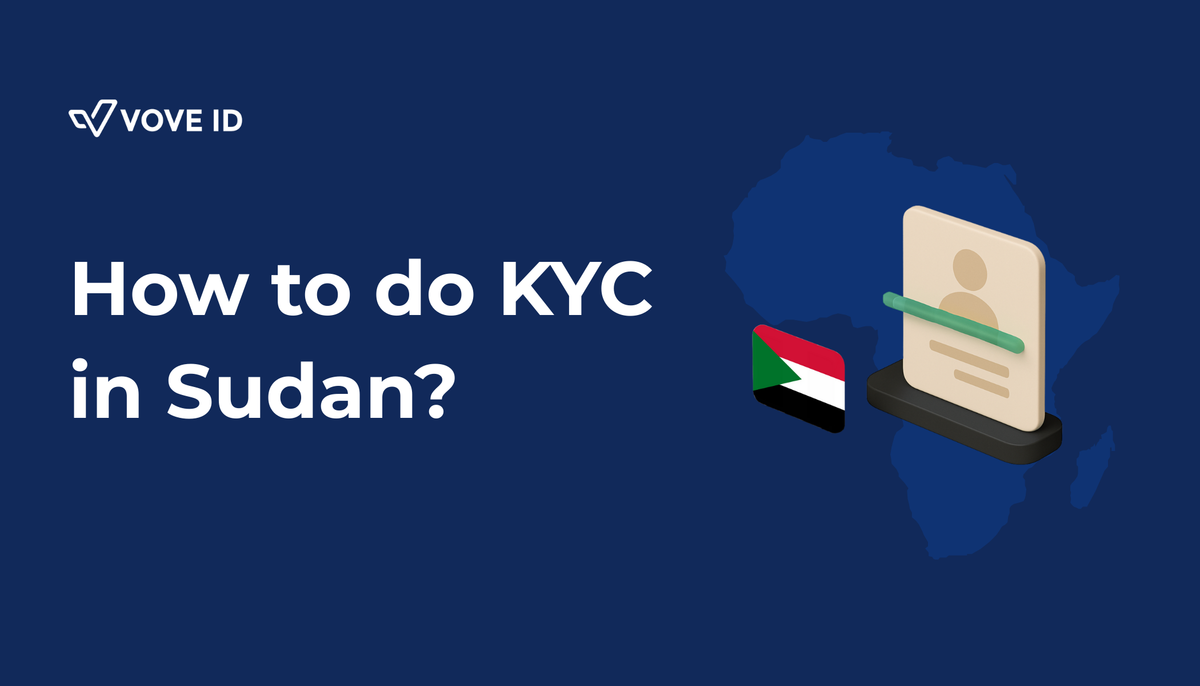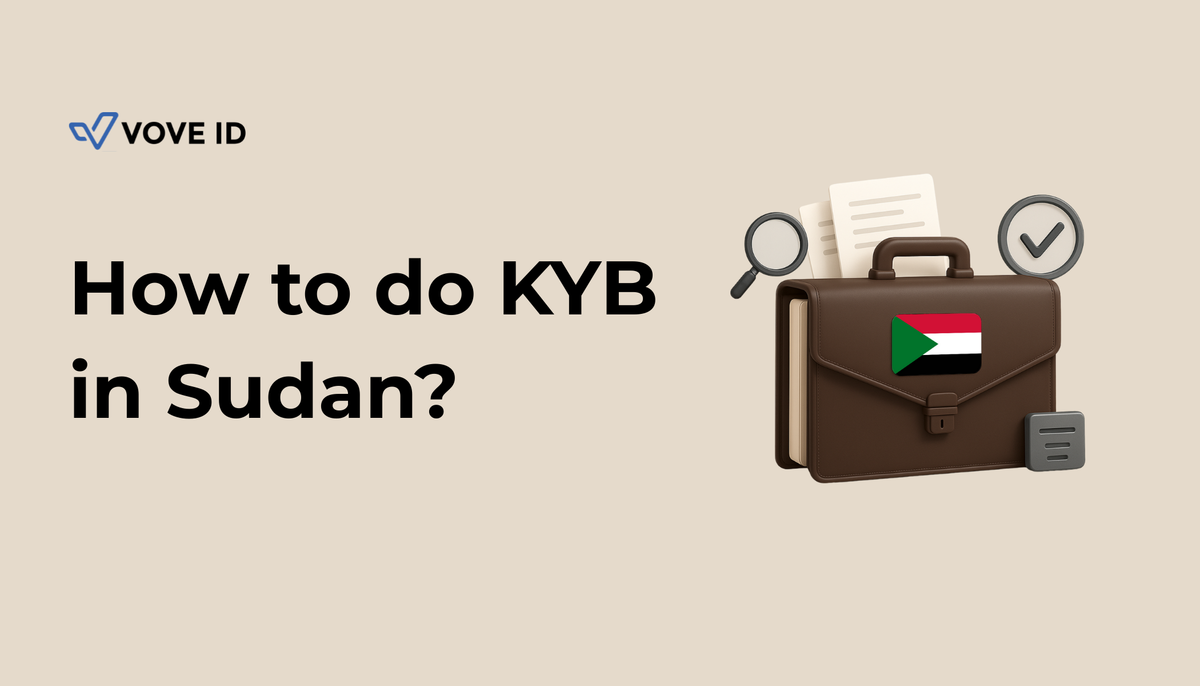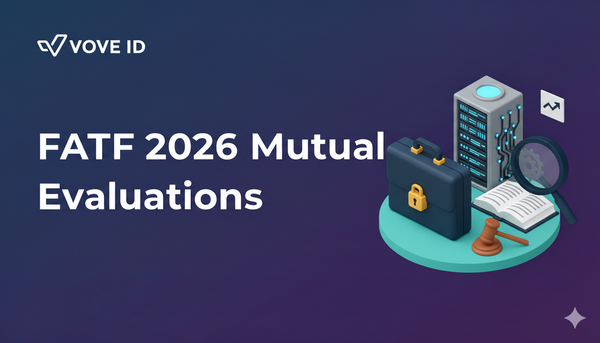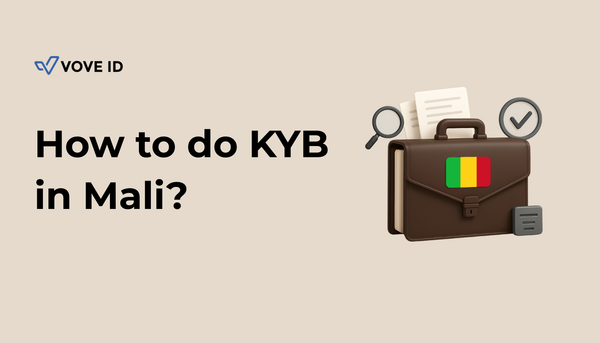AML Compliance in Sudan: 2025 Guide for Regulated Businesses
Master AML compliance in Sudan for 2025 with CBOS and FIU regulations. Learn key requirements, challenges, and how VOVE ID supports digital identity verification.

As Sudan’s financial sector moves through a period of reconstruction and digital transformation, Anti-Money Laundering (AML) and Combating the Financing of Terrorism (CFT) measures are taking center stage.
Banks, fintechs, and remittance providers must now meet tighter standards from the Central Bank of Sudan (CBOS) and the Financial Intelligence Unit (FIU).
In this evolving compliance environment, VOVE ID helps regulated businesses verify identities, manage AML workflows, and build trust through secure, AI-powered identity verification.
Read about KYC and KYB in Sudan:


Regulatory Framework: AML/CFT Act and MENAFATF Recommendations
Sudan’s primary legal foundation for AML and CFT is the Anti-Money Laundering and Combating the Financing of Terrorism Act (2014).
This law remains in force as of 2025, with no major amendments reported, though CBOS continues aligning its framework with FATF and MENAFATF recommendations.
Under the AML/CFT Act:
- CBOS issues circulars and compliance directives to financial institutions.
- The FIU monitors suspicious transactions and coordinates enforcement.
- All financial institutions and DNFBPs (e.g., real estate agents, lawyers, accountants) must conduct Customer Due Diligence (CDD) and, where applicable, Enhanced Due Diligence (EDD).
The Act criminalizes money laundering, mandates identification of beneficial owners, and enforces penalties for non-compliance.
For Sudanese businesses, AML compliance is no longer optional, it’s a critical step toward transparency, resilience, and access to international financial systems.
The AML and CFT Process in Sudan
Sudan’s AML/CFT framework follows global best practices while adapting to local realities.
1. Customer and Entity Identification
Institutions must verify customer identities using valid documents such as:
- National ID cards
- Passports
- Driver’s licenses
- Business registration certificates
Solutions like VOVE ID streamline this process through Automated Identity Verification, combining document scanning, OCR, and biometric checks to ensure data accuracy.
2. Beneficial Ownership Mapping (UBO Discovery)
Businesses must identify the Ultimate Beneficial Owners (UBOs) — individuals who ultimately own or control more than 25% of a company’s shares or influence its operations.
This requirement enhances transparency and aligns Sudan’s system with FATF’s risk-based approach.
3. Transaction Monitoring and Reporting
Financial institutions must monitor customer activity and report suspicious transactions to the FIU using established reporting channels.
Automated tools help detect anomalies in real time.
4. Recordkeeping and Audit-Ready Formats
Regulated entities are required to maintain accurate customer and transaction records for several years, ensuring quick access for regulatory audits and investigations.
Challenges in Implementing AML Compliance in Sudan
Despite steady progress, several challenges continue to shape Sudan’s AML environment:
- Informal Economy:
Estimates suggest that over 60% of Sudan’s businesses operate informally, per World Bank and IMF estimates, making beneficial ownership verification complex. - Limited Digital Infrastructure:
Many institutions still rely on manual data collection and paper-based systems, especially in rural areas. - Sanctions and Geopolitical Risk:
Sudan’s history of U.S. and UN sanctions, tied to past conflicts, requires strong counterparty screening and sanctions-list management. - Data Fragmentation:
Outdated or incomplete registries make it difficult to cross-verify business information. - Connectivity Gaps:
Remote and rural areas experience unreliable internet access, complicating real-time verification.
In this environment, VOVE ID’s technology offers a practical advantage: a cloud-based, API-ready platform optimized for low-bandwidth and offline-capable environments, common in rural Sudan.
How VOVE ID Supports AML and CFT Compliance in Sudan
VOVE ID provides tools that simplify compliance while reducing manual workload.
Its solutions are designed to meet the operational challenges of financial institutions across Africa, including Sudan.
- Automated Identity Verification: Supports document and biometric checks to help verify individuals and businesses with accuracy.
- Beneficial Ownership Mapping (UBO Discovery): Enables visibility into ownership structures and key stakeholders.
- Risk and Sanctions Screening: Provides screening capabilities against major international watchlists, such as UN and OFAC.
- API Integration: Designed to connect easily with digital onboarding systems and business platforms.
- Secure Recordkeeping: Maintains verification data in compliance-friendly formats suitable for audits and reporting.
With VOVE ID, businesses can stay ahead of regulatory expectations and maintain operational integrity, even in constrained environments.
Sudan’s AML/CFT Act mandates reporting of suspicious transactions exceeding a certain threshold, regardless of whether a crime is proven.
DNFBPs such as real estate agents, lawyers, and accountants are now required to perform AML checks similar to banks.
The fintech sector is expected to grow significantly in 2025, driven by digital payment adoption and mobile money innovation.
Automated KYB and AML tools can cut onboarding times by up to 70%, even in low-connectivity regions.
❓Frequently Asked Questions
Who regulates AML compliance in Sudan?
The Central Bank of Sudan (CBOS) and the Financial Intelligence Unit (FIU) oversee AML/CFT compliance and reporting obligations.
What digital initiatives support AML modernization?
CBOS is exploring digital registry enhancements in partnership with international organizations to improve access to reliable business and customer data.
Is electronic AML verification (eKYC) recognized?
Yes. While not fully codified, eKYC and digital verification methods are accepted by CBOS when they meet reliability and authenticity standards.
What are the penalties for AML non-compliance?
Non-compliance under the AML/CFT Act can result in fines, license suspension, or criminal liability for executives.
Conclusion: Building a Transparent Financial Future
AML compliance in Sudan is central to restoring international confidence and strengthening domestic financial systems.
By adopting modern, automated tools, institutions can move beyond manual compliance to proactive, data-driven integrity management.
VOVE ID enables this transformation — offering secure, scalable, and locally adapted identity verification that empowers compliance teams to meet CBOS and FIU standards confidently.
👉 Start strengthening your AML framework today with VOVE ID, your trusted partner for secure digital compliance across Africa.






